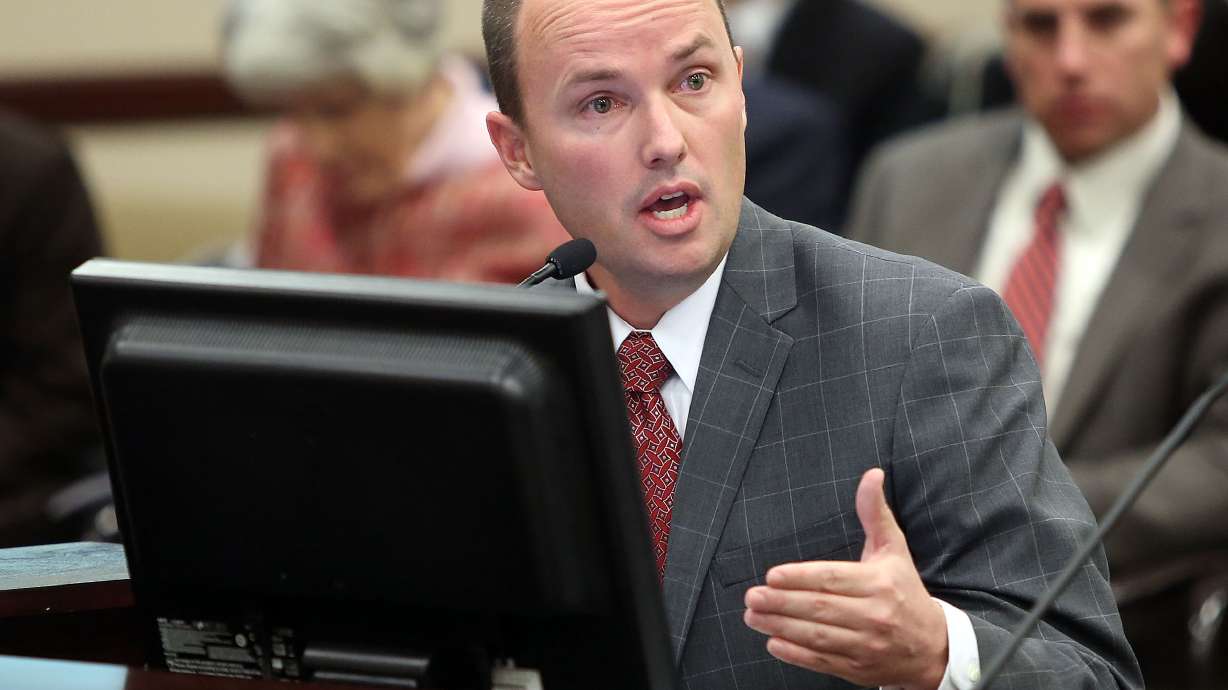Estimated read time: 4-5 minutes
This archived news story is available only for your personal, non-commercial use. Information in the story may be outdated or superseded by additional information. Reading or replaying the story in its archived form does not constitute a republication of the story.
SALT LAKE CITY — A federal judge Monday permanently barred the state from forcing political parties to hold open primary elections and dismissed all other claims in the Utah Republican Party's lawsuit.
As U.S. District Judge David Nuffer closed the case, the Utah GOP and the state continued to wrangle over the meaning of part of the law, setting the stage for another court battle, possibly before the Utah Supreme Court.
Meantime, Gov. Gary Herbert told the Republican State Central Committee over the weekend that he wishes he would have vetoed the controversial new election law and let voters decide the issue as proposed by the Count My Vote initiative.
"Unfortunately, instead of uniting us all together, the change has created divisiveness with one lawsuit after another," Herbert's spokesman Jon Cox said Monday. "In hindsight, the governor believes the public should have voted on the Count My Vote petition to settle the issue once and for all."
Utah Lt. Gov. Spencer Cox in a letter last week disagreed with the Utah GOP's reading of sections of the law about the paths candidates may take to get on the primary election ballot.
The law clearly states that the choice belongs to the candidate, and that the state would allow candidates to go through the convention, gather signatures or both, he wrote.
"And, finally, your interpretation would render the entire statute meaningless and, I think you would agree, undermine the legislative intent," Cox wrote in response to a letter from Utah GOP Chairman James Evans seeking clarification from the state after Nuffer's ruling.
Evans argues that SB54 permits parties to choose between the convention system or signature gathering on behalf of their candidates. The Republican Party has chosen the convention route and candidates who only collect signatures would no longer be members of the party under new rules the party adopted in August, he said.
Count My Vote two years ago set out to increase voter participation by changing how political parties choose candidates. Initiative supporters dropped the statewide petition drive calling for a referendum on a direct primary election in exchange for getting an alternative path to the ballot.
As a compromise, the Republican-controlled Utah Legislature passed SB54 to let parties keep the state's unique caucus and convention system for choosing nominees, but also allow candidates to collect signatures to get on the primary ballot.
The Utah GOP says it was not involved in the deal and asked the court last December to strike down the law.
Related:
Nuffer earlier this month struck down a provision in the law that required political parties to open primary elections to all voters. The Utah GOP allows only registered Republicans to vote in its primaries. The ruling left the rest of SB54 intact, including letting candidates gather signatures without going through a party convention to get on the primary ballot.
Nuffer noted his ruling applies only to the Utah Republican Party and the Utah Constitution Party, both of which sued the state over SB54.
At the GOP central committee meeting on Saturday, Herbert encouraged the party to "join hands with the state" to petition the Utah Supreme Court to settle the disagreement, according to an email Sen. Todd Weiler, R-Woods Cross, sent to legislators Monday.
Herbert also said at the meeting that he signed SB54 because he believed the Count My Vote initiative would pass, and he favored a compromise that would preserve the caucus system, according to Weiler. But Herbert also said that if he had known then what he knows now, he would have had vetoed SB54 to let voters decide.
Evans said Utah GOP lawyers intend to ask Nuffer to certify legal questions on the issue to the Utah Supreme Court.
"We're ready to go to court now," he said.
Going to the state supreme court, and as soon as possible, seems to be the only thing the Utah Republican Party and the state agree on. Both sides say they don't want to disrupt the 2016 election cycle. Candidates may file to run and start gathering signatures starting Jan. 4.
"The uncertainty that currently exists is bad for voters, it's bad for candidates, it's bad for parties, and it's bad for the state of Utah," Cox wrote. "We need certainty and we need it soon."









